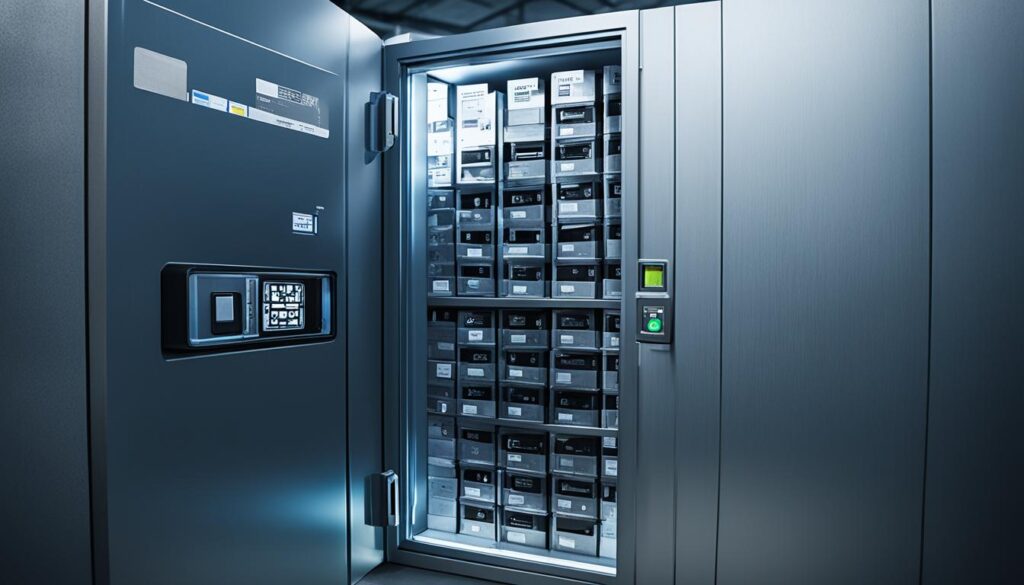[ad_1]
An astonishing 42 million people across the United States currently own Bitcoin alone, but did you know that the security and utility of these digital assets hinge on the crypto wallet types they choose? With a spectrum ranging from hot wallets connected to the internet 24/7 to cold wallets ensconced in physical barriers, selecting the best crypto wallets is a crucial decision for any crypto enthusiast. This detailed guide will aid you in navigating the intricate world of secure crypto wallets, ensuring that your digital riches are well-guarded, well-managed, and poised for growth.
Selecting the right wallet is more than just a matter of safety; it’s a strategic choice tailored to your cryptocurrency dealings. Whether you’re a day trader needing swift transactions or a long-term investor seeking impenetrable security, knowing how to choose a crypto wallet can make all the difference. Let’s dive in and discover which wallet aligns perfectly with your digital lifestyle, giving you peace of mind and easy access to the burgeoning realm of digital currencies.
Key Takeaways
- Learn about the different crypto wallet types and their unique benefits for digital asset management.
- Understand the importance of choosing secure crypto wallets to safeguard your investments.
- Gain insights into the features that determine the best crypto wallets for various uses.
- Discover practical tips on how to choose a crypto wallet that fits your personal and financial requirements.
- Identify the right combination of security, convenience, and accessibility to enhance your cryptocurrency experience.
Understanding Cryptocurrency Wallets
In the ever-evolving digital landscape, cryptocurrency wallets are essential for individuals looking to engage with the digital economy. These wallets not only facilitate the transactional aspect of cryptocurrencies but also serve as a point of entry for digital asset management. Let’s delve deeper into the crypto wallet definition and its role in the digital domain.
What is a Crypto Wallet?
A crypto wallet acts as a virtual bank account for your cryptocurrencies, providing a secure interface through which you can interact with your digital assets. It’s important to understand that while the term “wallet” suggests storage, the actual currencies are not stored there physically. Instead, a cryptocurrency wallet contains a pair of keys: the public key, which you share to receive funds, and the private key, which you guard to authorize transactions and access your assets.
The Role of Wallets in Managing Digital Assets
The pivotal role of cryptocurrency wallets in digital asset management cannot be overstated. These wallets maintain the delicate balance between accessibility and security for your digital assets. The private keys stored in your wallet are the only way to sign transactions on the blockchain, making them the backbone of cryptocurrency use and ownership. Without them, your digital assets remain locked away in the digital ledger, out of reach.
| Wallet Feature | Function | Benefit |
|---|---|---|
| Public Key | Receives funds from others | Allows receiving of cryptocurrencies without compromising security |
| Private Key | Authorizes transactions | Provides secure access to your digital assets |
| User Interface | Facilitates interaction with your wallet | Enhances user experience and management of assets |
Exploring Crypto Wallet Types
As you delve into cryptocurrency, understanding the different crypto wallet types is fundamental for managing your digital assets securely and effectively. Let’s examine the popular crypto wallet options available to users:
- Hardware Wallets: These are physical devices that store your private keys offline, providing enhanced security against online threats.
- Software Wallets: Accessible from your desktop or mobile device, these wallets provide convenience for everyday transactions.
- Online Wallets: These wallets run on the cloud and can be accessed from any computing device, offering ease of access with varying degrees of security.
- Paper Wallets: A physical document containing your private and public keys, offering a high level of security, but less convenient for frequent access.
To help you compare these options, the following table breaks down their key features:
| Wallet Type | Convenience | Security Level | Ideal Use Case |
|---|---|---|---|
| Hardware Wallets | Low – Requires physical device | High – Offline storage | Long-term investment |
| Software Wallets | High – Easily installed on devices | Medium – Vulnerable to malware | Everyday transactions |
| Online Wallets | Very High – Cloud access | Low to Medium – Dependent on service provider | Convenience and trading |
| Paper Wallets | Low – Not meant for regular use | High – No digital exposure | Secure storage backup |
Each wallet type offers its own balance between security and convenience, so consider how often you’ll access your funds and what level of security makes you comfortable. Whether opting for hardware wallets for maximal security or the ready access of online wallets, there’s a wallet to suit your crypto journey.
Remember, while paper wallets may not be as popular as other options, they are an exceedingly secure form of cold storage for your cryptocurrency assets.

Distinguishing Hot vs Cold Wallets
When diving into the world of cryptocurrency, understanding the difference between hot wallets and cold wallets is crucial for the security of your digital assets. These wallet types offer different levels of connectivity and security, tailoring to distinct uses and preferences within the crypto space.
Connectivity and Security: A Core Differentiation
Hot wallets are digital wallets that maintain a constant connection to the internet, providing on-the-go connectivity for ease in conducting transactions. Such wallets are convenient for regular trading and purchasing, but this also makes them susceptible to online threats, highlighting the disadvantages of hot wallets. In contrast, cold wallets offer secure storage by remaining offline, thereby greatly reducing the risk of cyber-attacks and malicious activities.

Use Cases for Hot Wallets vs Cold Wallets
Considering their features, each type serves distinct purposes. Hot wallets cater to those requiring instant access and regular transactions, akin to a checking account. It’s the go-to for everyday cryptocurrency dealings. However, for substantial investments and storage that you don’t intend to access frequently, the advantages of cold wallets become apparent. With cold wallets, your assets are far less exposed, making them comparable to a high-security savings account for your digital currencies.
Ultimately, employing both hot and cold wallets could achieve a balance, utilizing the secure storage of cold wallets for long-term holdings while enjoying the convenient connectivity of hot wallets for active trading and spending. This strategy ensures both security and accessibility, addressing the needs of diverse crypto investors.
Hardware vs Software Wallets: Pro’s and Con’s
In the landscape of cryptocurrency security, you face a critical choice between hardware wallets and software wallets. Each comes with a distinct set of features that cater to different needs and preferences. Delving into the intricacies of both types will shed light on their benefits and limitations, helping you make an informed decision for safeguarding your digital assets.
Understanding Hardware Wallets Physical Security
When it comes to physical security, hardware wallets stand out as the vaults of the cryptocurrency world. They store your private keys on a secure physical device, which is often disconnected from the internet, greatly reducing the risk of cyber-attacks. Prominent brands like Ledger and Trezor are lauded for their robust security measures. To execute a transaction, you typically need the device in hand, further ensuring that only you have the access to move your funds. This caliber of security makes hardware wallets an optimal choice for substantial investments or for users who prioritize long-term holding over frequent trading.
Why Choose a Software Wallet?
Software wallets, in contrast, are celebrated for their convenience and user-friendly experience. Accessibility is their strong suit, enabling you to manage your digital currencies effortlessly from your smartphone or computer. With software wallets, conducting transactions and keeping track of your investments become seamless activities that favor the fast-paced, connected lifestyle of modern users. Nevertheless, this convenience comes with an increased exposure to online threats such as malware and phishing scams. You’ll need to weigh the ease of use against the potential security concerns when deciding if a software wallet aligns with your crypto management strategy.
FAQ
What is a crypto wallet?
A crypto wallet is a digital application or device that enables users to securely store, send, and receive digital assets such as cryptocurrencies.
What is the role of wallets in managing digital assets?
Wallets play a vital role in managing digital assets by providing a secure and convenient way to store and access cryptocurrencies. They store private keys and facilitate transactions on the blockchain network.
What are the different types of crypto wallets?
The main types of crypto wallets include hardware wallets, software wallets, online wallets, and paper wallets.
What is the difference between hot wallets and cold wallets?
Hot wallets are connected to the internet, allowing for easy access and transactions, but they are less secure. Cold wallets are offline and offer enhanced security but require more steps to access funds and make transactions.
Why choose a hardware wallet?
Hardware wallets provide the highest level of security by storing private keys offline on a physical device. This minimizes the risk of online hacking or theft.
Why choose a software wallet?
Software wallets offer convenience and accessibility, as they can be easily installed on smartphones or computers. However, they are generally considered less secure than hardware wallets.
[ad_2]
Source link
